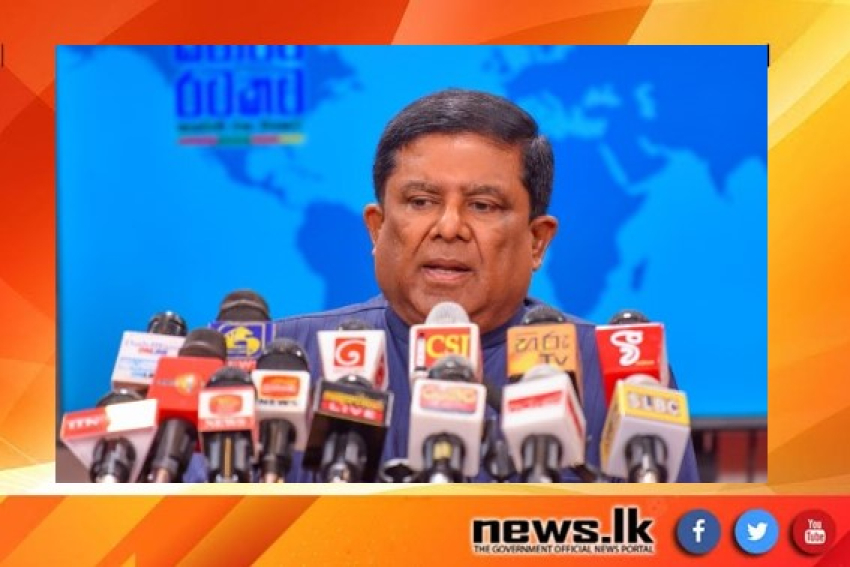Addressing a media briefing held at the Presidential Media Centre (PMC) yesterday (07), under the theme ‘Collective path to a stable country,’ Member of Parliament Mr. Wajira Abeywardena articulated the importance of fostering unity and supporting the country’s comprehensive development program. He emphasized that President Ranil Wickremesinghe has launched an official initiative to bolster both the 1.6 million public sector employees and the 8 million private sector employees, with a focus on advancing the nation’s economic well-being.
Mr. Abeywardena underscored the potential benefits of this program, emphasizing that its success, under President Wickremesinghe’s leadership, can lead to future reductions in the prices of essential commodities such as electricity, gas and fuel, ultimately contributing to a more prosperous and stable economy for the citizens.
Mr. Abeywardena went on to provide a more in-depth analysis of the nation’s economic trajectory. He emphasized that aligning the state’s budget with its financial apparatus should primarily address the path to recovery for a country that had faced bankruptcy. He pointed out that the economic crisis had intensified after a regime change in 2019, marked by a shift in tax policy that led to a rapid erosion of government revenue. In response, the government resorted to printing money through the central bank, leading to a surge in inflation.
The nation’s economy suffered a significant setback and ultimately declared bankruptcy, but President Ranil Wickremesinghe assumed leadership and garnered the trust of crucial stakeholders, including international financial institutions such as the International Monetary Fund (IMF), the World Bank (WB) and the Asian Development Bank (ADB). Consequently, the country’s economic revival is well underway.
Mr. Wickremesinghe’s prior role as Prime Minister from 2001 to 2003 played a pivotal role in rebuilding the nation. However, this era came to an end on April 10, 2004 and by 2014, the country was once again on the brink of financial collapse. The subsequent economic recovery took place in 2015 under his leadership, with government employees receiving substantial salary increases and both the public and private sectors being reinforced to establish the essential foundations for economic stability.
Regrettably, in 2020, the government that implemented these reforms was overthrown by a coalition of government employees and the public, resulting in a period of instability.
Against the backdrop of the nation’s on-going economic crisis and its successful efforts to navigate this challenge, Mr. Abeywardena cautioned against initiating strikes. Such actions, often accompanied by demonstrations and slogans, can harm the nation’s international reputation and deter potential tourists. In light of the present situation, Mr. Abeywardena stressed the necessity for government trade unions to adopt new and more effective strategies rather than relying on traditional strike practices, as these may not yield the desired results.
Significant changes have already been introduced through new rules and regulations, addressing existing deficiencies, strengthening various sectors and responding to the demands of the public. Additionally, steps are being taken to ensure that political parties refrain from making unwarranted promises.
President Ranil Wickremesinghe has also announced plans to increase the salaries of 1.6 million government employees in this year’s budget, with similar adjustments in the private sector. President Wickremesinghe’s formal program aims to fortify both the public and private sectors, which together employ millions of individuals.
The success of this program is expected to result in a tangible reduction in the prices of essential commodities, including electricity, gas and fuel, fostering a more stable and comfortable economic environment for the population.
In light of the severe economic crisis facing the nation, the call to action is for the public sector and the entire population to comprehend the present situation and wholeheartedly engage in the nation’s development over the next 5 to 10 years.
It’s worth noting that the current government is taking measures to safeguard the functioning of the entire state machinery. President Wickremesinghe has outlined plans to attract 10 million tourists in the coming year as a means to alleviate the substantial debt burden. To achieve this goal, efforts are underway to enhance facilities for tourists and demonstrate political stability.
In a forward-looking move, President Wickremesinghe has established a “National Council” in the Parliament, providing a platform for all individuals to present national concerns and encouraging a more inclusive and innovative approach to politics. This signals a departure from conventional political methods, emphasizing the need for fresh ideas and approaches to address the nation’s challenges. All political parties and civil society groups are invited to submit their proposals in addition to the existing program.
PMD




















